Nestled in the vibrant city of Jaisalmer, The Thar Heritage Museum offers an immersive journey into the unique culture and history of the Thar Desert. Established to preserve and showcase the rich heritage of the desert region, this museum features an extensive collection of artefacts, including traditional attire, ancient manuscripts, and intricate handicrafts. The museum’s exhibits provide valuable insights into the daily life, traditions, and artistry of the desert communities. Whether you’re interested in historical artefacts or cultural practices, The Thar Heritage Museum offers a comprehensive exploration of Rajasthan’s desert heritage.
The Thar Heritage Museum Location
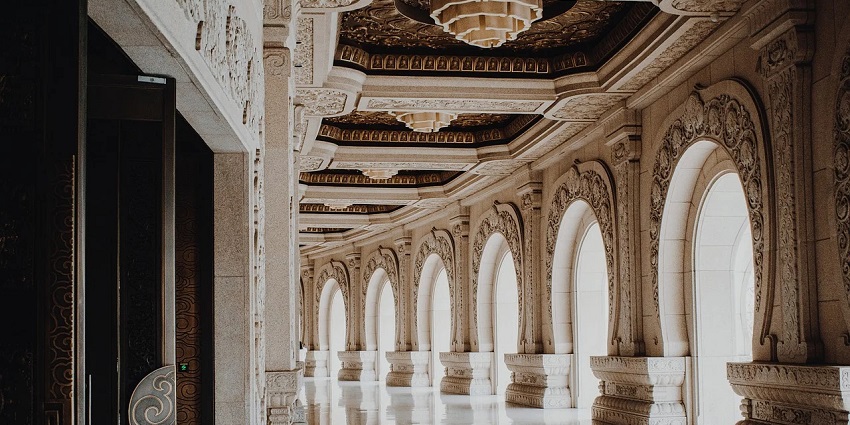
Photo: Mr-Bozen / Pixabay / Image For Representation Only
The Thar Heritage Museum is located in the heart of Jaisalmer, Rajasthan, India. Housed in a traditional haveli, the museum embodies the architectural style of the Thar Desert region, with its intricate woodwork and sandstone carvings. The museum is dedicated to preserving and presenting the cultural and historical legacy of the desert communities.
Suggested Read: Places To Visit Near Jaisalmer
How To Reach The Thar Heritage Museum
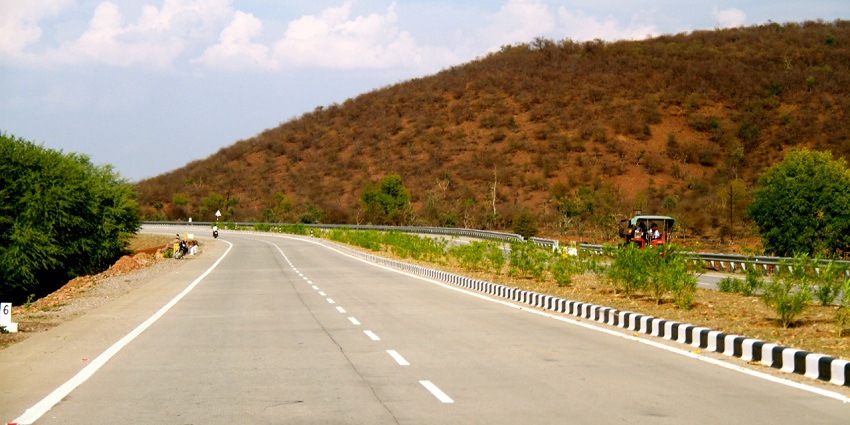
Photo: TeshTesh / Wikimedia Commons / Image For Representation Only
By Air: Jaisalmer Airport, located approximately 5 kilometres from The Thar Heritage Museum, is the nearest airport. The airport is well-connected with major cities in India. From the airport, taxis or auto-rickshaws can easily take you to the museum.
By Bus: Jaisalmer is accessible by bus from various cities in Rajasthan and neighbouring states. The Jaisalmer Bus Stand is around 3 kilometres from the museum. You can hire a taxi or an auto-rickshaw to reach the museum from the bus stand.
By Rail: The Jaisalmer Railway Station is about 4 kilometres from The Thar Heritage Museum. The station has excellent connectivity to major cities throughout India. Taxis and auto-rickshaws are conveniently available at the railway station for a quick journey to the museum. The train journey provides an engaging introduction to the desert terrain and historical landmarks of Jaisalmer.
Places To Visit In And Around The Thar Heritage Museum
This museum offers a fascinating glimpse into the desert region’s traditions, artefacts, and folklore. Beyond the museum, explore nearby attractions that highlight the beauty and cultural heritage of Jaisalmer.
1. Jaisalmer Fort
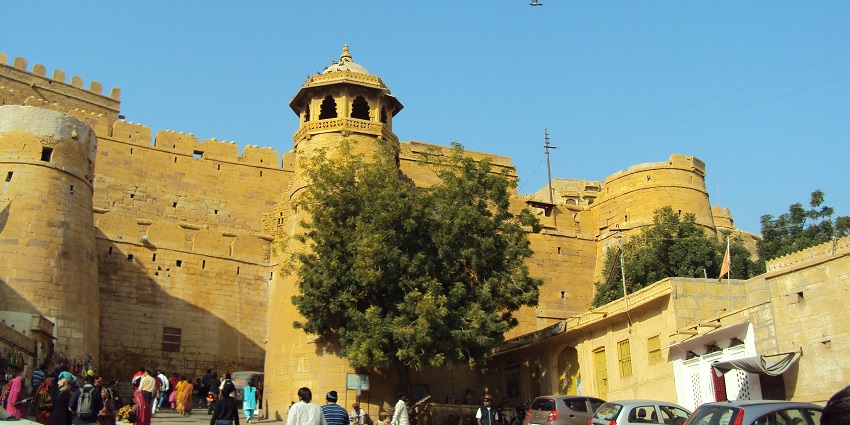
Photo: Lucentmind / Wikimedia Commons
Jaisalmer Fort, located about 1 kilometre from The Thar Heritage Museum, is one of the most iconic landmarks in Jaisalmer. Built-in 1156 by Maharaja Jaisal, the fort is a magnificent example of Rajasthani architecture and a UNESCO World Heritage Site. The fort’s golden sandstone walls give it a distinctive appearance, blending seamlessly with the desert surroundings. Inside the fort, visitors can explore historic palaces, temples, and residences that reflect the opulent lifestyle of the Maharajas.
Timings: 9 AM – 5 PM
Entry Fee: ₹100 for adults, ₹50 for children
Suggested Read: Jaisalmer Fort Palace Museum
2. Patwon Ki Haveli
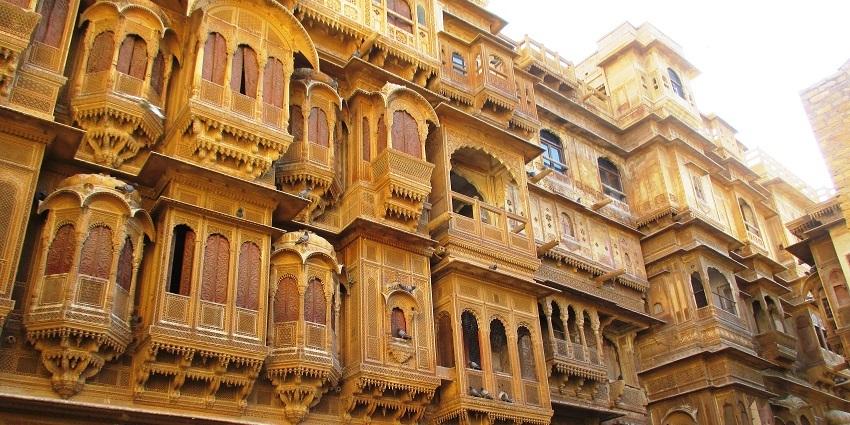
Photo: Sreesarkar / Wikimedia Commons
Located approximately 2 kilometres from The Thar Heritage Museum, Patwon Ki Haveli is a remarkable showcase of Jaisalmer’s architectural legacy. Built-in the 19th century by a wealthy merchant, this haveli is renowned for its elaborate carvings and intricate detailing. The haveli features five separate mansions, each adorned with beautiful frescoes, jharokhas (balconies), and chhatris (cenotaphs). The rich craftsmanship and ornate designs reflect the opulence of the merchant class during that era. Visitors can explore the various rooms and courtyards of the haveli, each showcasing a unique aspect of traditional Rajasthani architecture.
Timings: 10 AM – 6 PM
Entry Fee: ₹100 for adults, ₹50 for children
3. Sam Sand Dunes
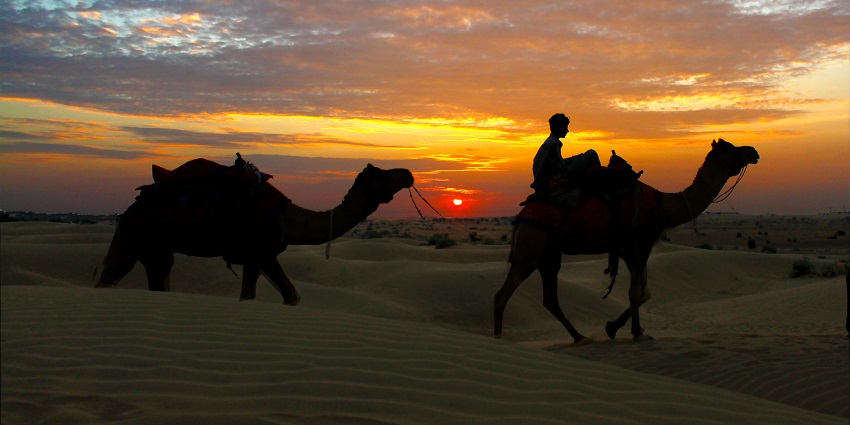
Photo: Manish Pareek / Wikimedia Commons
Sam Sand Dunes, located approximately 40 kilometres from The Thar Heritage Museum, provides an authentic desert experience. The dunes are a popular destination for camel safaris and desert camping, offering visitors a chance to experience the vastness of the Thar Desert. The endless golden dunes extend beyond the horizon, forming a stunning backdrop perfect for photography and various outdoor pursuits. Camel rides at sunset provide a unique perspective of the desert, with the changing hues of the sand creating a magical atmosphere.
Timings: 6 AM – 7 PM
Entry Fee: N/A
Suggested Read: Desert Safari Jaisalmer
4. Kuldhara Village
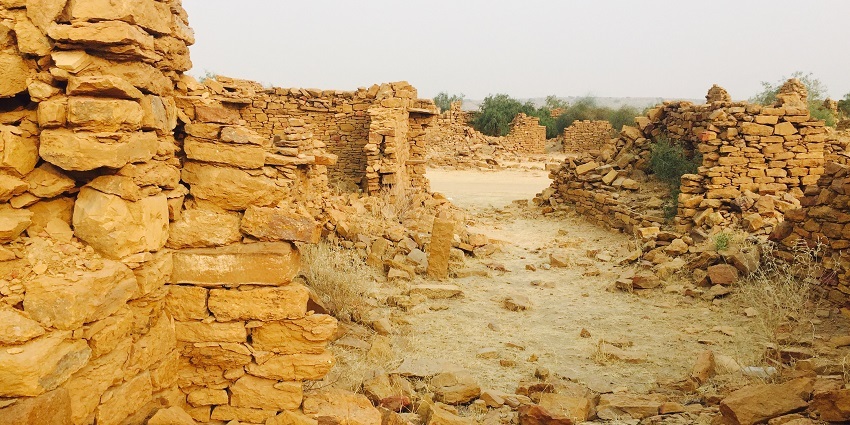
Photo: Shipraa1509 / Wikimedia Commons
Kuldhara Village, situated about 30 kilometres from The Thar Heritage Museum, is a historic abandoned village known for its eerie charm and architectural heritage. Founded in the 13th century, the village was once a prosperous settlement but was abandoned overnight due to unknown reasons. The well-preserved ruins include remnants of traditional Rajasthani architecture, such as havelis and step-wells, providing insight into the village’s past. The village’s desolate atmosphere and historical significance make it a fascinating site for visitors interested in exploring Rajasthan’s cultural history.
Timings: 6 AM – 6 PM
Entry Fee: Free
Where To Stay

Photo: ManuelaJaeger / Pixabay / Image For Representation Only
Accommodation options near The Thar Heritage Museum cater to various preferences and budgets. For a luxurious experience, consider staying at the Suryagarh Jaisalmer or the Fort Rajwada, both of which offer elegant rooms and top-notch amenities. Mid-range options include the Hotel Nachana Haveli and the Desert Tulip Hotel, providing comfortable lodging with a touch of local charm. Budget travellers can choose from hotels like the Hotel Shree Karni Bhawan or the Hotel Gandhi International, which offer affordable yet pleasant accommodations.
Suggested Read: Jaisalmer Museums
Where To Eat
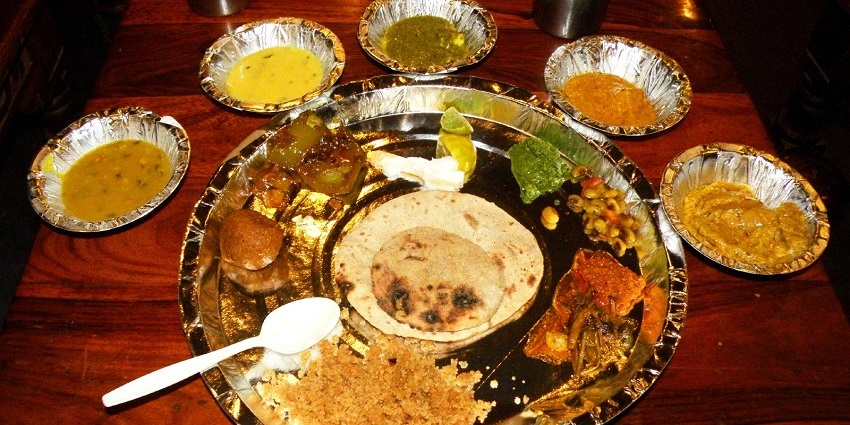
Photo: Raveesh / Wikimedia Commons / Image For Representation Only
Jaisalmer offers a range of dining options near The Thar Heritage Museum. For authentic Rajasthani cuisine, visit the Trio or the Desert Boy’s Dhani, both of which serve traditional dishes in a rustic setting. The Café The Kaku and the Café Edelweiss offer a blend of Indian and international cuisines, catering to various tastes. Additionally, the Saffron Restaurant and the Rajasthani Dhaba provide casual dining with a variety of local and continental dishes.
Best Time To Visit
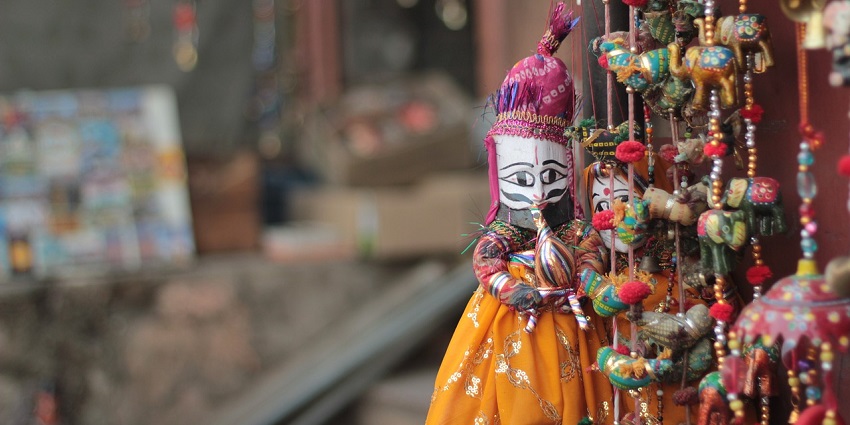
Photo: archikula / Pexels / Image For Representation Only
The best time to visit The Thar Heritage Museum is from October to March when the weather is cooler and more pleasant. During this period, daytime temperatures range from 15°C to 25°C (59°F to 77°F), making it comfortable for exploring both indoor and outdoor attractions. The cooler weather is ideal for exploring the museum’s exhibits and enjoying other local sights. The summer months, from April to June, can be extremely hot, with temperatures often exceeding 40°C (104°F), making travel and sightseeing less enjoyable.
Suggested Read: Things To Do In Jaisalmer
Other Factors To Consider
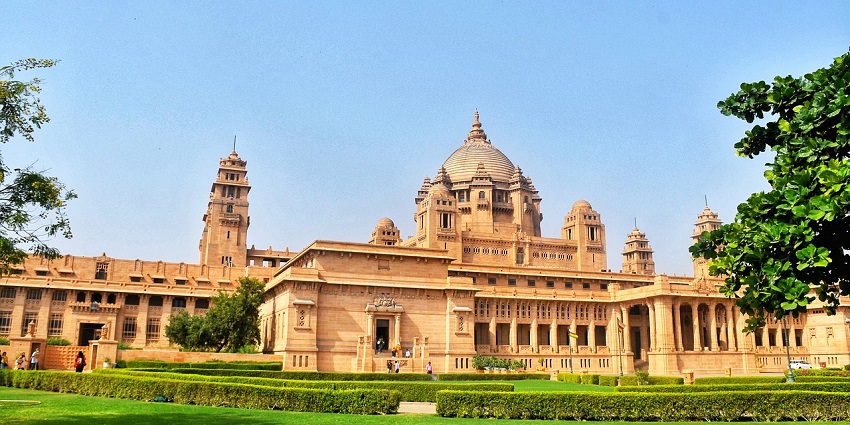
Photo: PINKI_ISHAN / Pixabay / Image For Representation Only
Average Cost Of Trip
The average cost of a trip to The Thar Heritage Museum varies depending on your preferences. For budget travellers, expenses typically range from ₹2,000 to ₹3,000 per day. Those opting for a mid-range experience can expect to spend between ₹3,000 and ₹6,000 per day. For a more luxurious visit, costs start at ₹10,000 per day and above, offering premium accommodations and services.
Tips For Travellers
- Wear Comfortable Clothing: Choose light, breathable fabrics for comfort during hot weather.
- Stay Hydrated: Carry water bottles and drink plenty of fluids while exploring the city.
- Respect Local Customs: Dress modestly and respect local traditions when visiting cultural sites.
- Check Museum Hours: Verify the museum’s opening hours and entry fees before your visit.
The Thar Heritage Museum offers a captivating journey into the rich cultural and historical legacy of Rajasthan’s desert region. With its diverse collection of artefacts, stories, and traditions, it provides a deep insight into the local heritage. Whether you’re a history enthusiast or a curious traveller, a visit to this museum promises an enriching experience, making it an essential stop during your time in Jaisalmer.
Cover Photo: Ma_Frank / Pixabay / Image For Representation Only


 WhatsApp
WhatsApp
 Twitter
Twitter









